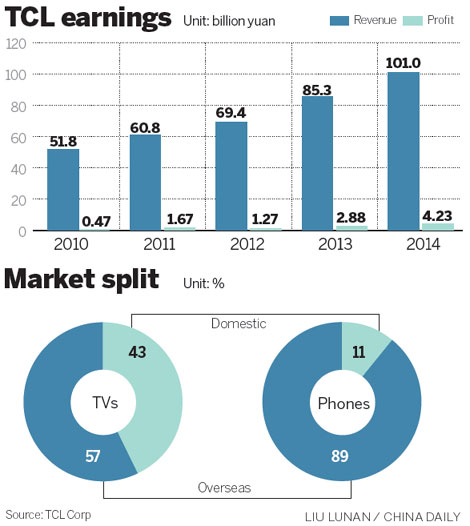 |
"We must be aware of which markets will boom in three or five years and enter them well in advance. We cannot wait until then," he said.
It requires boldness and decisiveness for a company to expand into the global market, according to Li Dongsheng, president and chief executive officer of TCL.
The electronics company made headlines when it acquired the TV business of French electronics firm Thomson SA for 230 million euros ($255 million) in January 2004. Seven months later, TCL stunned the telecommunications industry by acquiring Paris-based Alcatel Mobile Phone Ltd.
No other Chinese enterprise had made such large mergers and acquisitions before.
At that time, Thomson was among the world's top 500 companies and its TV business was bigger than TCL's. Li described the acquisition as "a snake swallowing an elephant". But the ambitious Chinese acquirer soon suffered indigestion.
TCL ran up gigantic losses of about 2.7 billion yuan ($422 million) in 2005, the first time it slipped into the red since inception in 1981. The overseas business did not stop sliding until 2009.
Li made a speech in November last year in Beijing about the lessons he learned from overseas mergers and acquisitions during the past 10 years.
He was candid about the misjudgment of the display technology transition. TCL acquired Thomson for its world-leading technology in terms of cathode-ray tube, which Li and his team believed would be the mainstream for another five years before being replaced by liquid crystal display.
However, LCD quickly took over the European market in 2005 and the US market in 2006, so TCL had to put in extra investment on technological development and supply chain upgrade.
As for the fast-changing telecommunications industry, TCL's mobile phone business at home plunged unexpectedly from 2004, due to intense competition from foreign brands and domestic copycats.
To reduce costs, it managed to move its research and development team of Alcatel in France to Shanghai. The acquisition of Alcatel's mobile phone patents also helped TCL-Alcatel enter the mainstream markets in Europe and the United States.
Without patents, few Chinese brands were able to enter the mainstream markets from 2006 to 2010, including Huawei Technologies Co Ltd and ZTE Corp, according to Li. The two Chinese smartphone vendors could only access the markets as original design manufacturers, he said.
Having gone through the pains of restructuring, TCL started to harvest gains of steady growth in overseas sales from 2009 onwards. Its operating revenue in 2014 hit 101 billion yuan, 46.6 percent of which came from overseas businesses.
